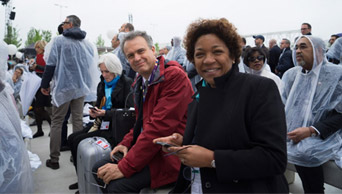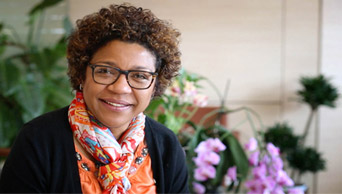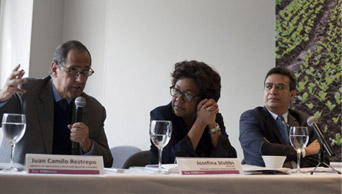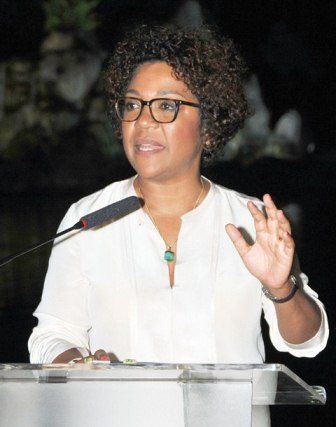Articles tagged with: humanitarian crisis
ROME, May 20 2016 (IPS) - “We cannot keep jumping from crisis to crisis. We have to invest in long-term development that helps people cope with shocks so that they can continue to grow enough food for their communities and not require emergency aid.”
With this clear warning, Josefina Stubbs, Chief Strategist of the UN’s International Fund for Agricultural Development (IFAD), has just launched a strong message for leaders who will gather at the World Humanitarian Summit in Istanbul, Turkey next week.
Recalling that more than 60 million people across the world are reeling from the drought caused by the weather phenomenon known as El Niño, Stubbs warns, “The demand for emergency assistance cannot keep up with the supply.”
Climate change is causing more extreme weather events and natural disasters resulting in an average displacement of 22.5 million people a year – equivalent to 62,000 people every day, says IFAD.
This movement of people can lead to local and regional instability. And when people are pushed away from rural areas and farming, it can threaten the food security of entire countries, it adds.
“Poor people in developing countries are disproportionately affected by disasters because they do not have the resources to cope with the impacts and bounce back,” says IFAD’s Associate Vice-President and Chief Strategist.
Africa, Asia-Pacific, Editors' Choice, Europe, Featured, Global, Global Governance, Globalisation, Headlines, Human Rights, Humanitarian Emergencies, IPS UN: Inside the Glasshouse, Latin America & the Caribbean, Middle East & North Africa, North America, Population, Poverty & SDGs, Projects, Religion, TerraViva United Nations
‘We Cannot Keep Jumping from Crisis to Crisis’
By Baher Kamal
Josefina Stubbs, IFAD's Chief Development Strategist, visits an IFAD-funded program in Guatemala’s Verapaces region, Arminda Cruz. The micro-irrigation project is improving the livelihoods and food security of thousands of smallholder farmers, especially women, in the country. Credit: IFAD
Josefina Stubbs, IFAD's Chief Development Strategist, visits an IFAD-funded program in Guatemala’s Verapaces region, Arminda Cruz. The micro-irrigation project is improving the livelihoods and food security of thousands of smallholder farmers, especially women, in the country. Credit: IFAD
ROME, May 20 2016 (IPS) - “We cannot keep jumping from crisis to crisis. We have to invest in long-term development that helps people cope with shocks so that they can continue to grow enough food for their communities and not require emergency aid.”
With this clear warning, Josefina Stubbs, Chief Strategist of the UN’s International Fund for Agricultural Development (IFAD), has just launched a strong message for leaders who will gather at the World Humanitarian Summit in Istanbul, Turkey next week.
Recalling that more than 60 million people across the world are reeling from the drought caused by the weather phenomenon known as El Niño, Stubbs warns, “The demand for emergency assistance cannot keep up with the supply.”
Climate change is causing more extreme weather events and natural disasters resulting in an average displacement of 22.5 million people a year – equivalent to 62,000 people every day, says IFAD.
This movement of people can lead to local and regional instability. And when people are pushed away from rural areas and farming, it can threaten the food security of entire countries, it adds.
“Poor people in developing countries are disproportionately affected by disasters because they do not have the resources to cope with the impacts and bounce back,” says IFAD’s Associate Vice-President and Chief Strategist.
People Are Not waiting for Hand-Outs
“These people are not waiting for hand-outs. They are looking for opportunities to keep earning incomes even in the face of disasters. Our focus should be on creating these opportunities.”
The current El Niño drought has had a catastrophic effect on crops around the world causing almost 32 million people in southern Africa alone to go hungry.
“This number is expected to rise to 49 million by the end of the year. The UN estimates that at least 3.6 billion dollars is required to meet emergency needs resulting from this drought. Less than half of this has been provided.”
Ethiopia is the worst hit in Africa, with 75 per cent of its harvests lost and emergency food assistance required for at least ten million people. IFAD has been working with small-scale farmers in the country for more than a decade to make them more resilient to the impacts of drought.
With investments in irrigation, water-harvesting techniques and early warning systems, and training in sustainable water usage, none of these communities have required any food aid during the current drought, says this UN agency, which since 1978 has provided about 17.7 billion dollars in grants and low-interest loans to projects that have reached some 459 million people.
“At IFAD we have seen that building resilience to disasters does work and saves communities from suffering,” says Stubbs. “But there has to be a global commitment to invest in long-term development.”
Changing Climate, Scarcity of Natural Resources
“The changing climate and the increasing scarcity of natural resources are also impacting the already precarious situation of the estimated 60 million people who have been forcibly displaced by conflict.”
Long-term investments are urgently needed to stimulate the economies of the rural areas of host countries where the majority of refugees live.
IFAD is an international financial institution and a specialised United Nations agency based in Rome – the UN’s food and agriculture hub. It invests in rural people, empowering them to reduce poverty, increase food security, improve nutrition and strengthen resilience.
The first-ever World Humanitarian Summit takes place on 23 and 24 May and originates from a growing concern about the protracted nature of recent humanitarian crises and the limited capacity of the global community to respond to them.
Some 6,000 world leaders and humanitarian and development agencies will gather in Istanbul to make commitments to help countries better prepare for and respond to crises.
“Human suffering from the impacts of armed conflicts and disasters has reached staggering levels,” the United Nations Secretary General, Ban Ki-moon, portrayed the current humanitarian drama, explaining why the UN has decided to hold the WHS.
For his part, in an interview to IPS, the UN Under-Secretary-General for Humanitarian Affairs, Office for the Coordination of Humanitarian Affairs and Emergency Relief Coordinator (OCHA), Stephen O’Brien, said “Every humanitarian crisis is inherently unique and context-specific.”
“However, taken together, there are 125 million people in need of aid in the world today as a result of conflicts and natural disasters and over 60 million people have been forcibly displaced. These are the highest numbers we have on record since WWII,” O’Brien told IPS.
It is not about one humanitarian crisis, but multiple crises happening at the same time, from the crisis in Syria and the region to the impact of El Niño, which currently affects 60 million people in the world, O’Brien said.
Herve Verhoosel, WHS spokesperson, wrote in an editorial for IPS “We are experiencing a human catastrophe on a titanic scale: 125 million in dire need of assistance, over 60 million people forcibly displaced, and 218 million people affected by disasters each year for the past two decades.”
More than 20 billion dollars is needed to aid the 37 countries currently affected by disasters and conflicts. Unless immediate action is taken, 62 percent of the global population– nearly two-thirds of all of us- could be living in what is classified as fragile situations by 2030,” Verhoosel stressed.
Time and time again we heard that our world is at a tipping point. Today these words are truer than ever before, he wrote, and added, “The situation has hit home. We are slowly understanding that none of us is immune to the ripple effects of armed conflicts and natural disasters.”
“We’re coming face to face with refugees from war-torn nations and witnessing first-hand the consequences of global warming in our own backyards. We see it, we live it, and we can no longer deny it.”
Articles
11.02.17
Mario Osava et Baher Kamal s'entretiennent avec Josefina Stubbs, IPS News.
FIDA 2017 - Place aux femmes dans le développement rural
07.02.17
Por Mario Osava e Baher Kamal, da IPS, IPS Notícias.
É tempo das mulheres no setor rural
06.02.17
Mario Osava y Baher Kamal entrevistan a Josefina Stubbs, IPS Noticias.
FIDA 2017 – Tiempo de las mujeres en el desarrollo rural
06.02.17
Mario Osava and Baher Kamal interview Josefina Stubbs, IPS News.
IFAD 2017 – It’s women’s turn in rural development
02.02.17
Josefina Stubbs, LinkedIn.
Investing in poor rural communities makes business sense
25.01.17
Josefina Stubbs, IPS Noticias.
La paz se siembra con el desarrollo rural
25.01.17
Josefina Stubbs, IPS News.
Récolter la paix: comment le développement rural fonctionne pour la prévention des conflits
23.01.17
Josefina Stubbs, IPS News.
Harvesting peace: how rural development works for conflict prevention
09.01.17
Josefina Stubbs, LinkedIn.
How a changing climate affects what makes it onto your plate
21.12.16
Josefina Stubbs, LinkedIn.
Food for the soul – a recipe for transforming poor rural communities
25.11.16
Josefina Stubbs, LinkedIn.
Powerless and bruised: why violence against women hurts development
25.11.16
Antonio Pita, El País.
Dar oportunidades al mundo rural es la única manera de regular la migración
17.11.16
Josefina Stubbs and David Lewis, IPS News.
Thriving rural communities is a recipe for healthy cities
17.11.16
Josefina Stubbs y David Lewis, IPS Noticias.
Las ciudades saludables requieren comunidades rurales prósperas
17.11.16
Josefina Stubbs et David Lewis, IPS News.
Les communautés rurales florissantes sont une recette pour des villes saines
23.05.16
Ashok Kumar, OneWorld South Asia.
World will make it in terms of SDGs only if India can: Josefina Stubbs, IFAD
20.05.16
Baher Kamal, IPS News.
We cannot keep jumping from crisis to crisis
25.08.15
Elena L. Pasquini, Devex News.
IFAD VP: Career success isn’t a mystery, it’s hard work
26.06.15
Massimo Latini & Nicola Nosengo, Rai EXPO Milano 2015.
Stubbs: “1 more billion people out of poverty” Interview with Associate Vice-president of Ifad about the ‘Millennium goals’, to be reached within 2015
News releases
14.02.17
The Government of the Dominican Republic decides to join forces with Togo in the last round of the elections and support its candidate.
11.02.17
Minister of Agriculture Ángel Estévez will travel to Rome to support the Dominican Republic Candidate Josefina Stubbs to the Presidency of the International Fund for Agricultural Development (IFAD)
Tag Cloud
- Africa
- European Union
- IFAD President
- India
- Latin America
- Latin America and the Caribbean
- Presidencia del FIDA
- Présidence du FIDA
- South East Asia
- Unión Europea
- Violence against women
- Violencia contra las mujeres
- acceso a mercados
- accès au marché
- agricultura
- agriculture
- alimentation
- alimentos
- asociaciones
- cambio climático
- career
- changement climatique
- cities
- ciudades
- civil society
- climate change
- crisis humanitaria
- desarrollo rural
- dicriminación
- discrimination
- développement rural
- extreme poverty
- food
- gestión del conocimiento
- grassroots organizations
- humanitarian crisis
- hunger
- immigration
- inversiones
- investments
- jóvenes
- knowledge management
- market access
- migración
- migration
- mujeres
- natural resources
- organizaciones rurales
- partnerships
- pobreza rural
- prosperidad
- prosperity
- prospérité
- recursos naturales
- research
- rural development
- rural poverty
- rural transformation
- sociedad civil
- sustainable development goals
- sustainable farming
- transformación rural
- transformation rurale
- urbanisation
- urbanización
- urbanization
- villes
- women
- youth
Publications



Contact
communications@josefinastubbs.net
Sending your message. Please wait...
Thank you for communicating with us.
We will respond as soon as possible.
Sorry, we were unable to send your message.
Please try again.
Please complete all fields before sending your message.
Please complete all fields before sending your message.

 English
English  Español
Español  Français
Français 


 Santo Domingo, Dominican Republic.
Santo Domingo, Dominican Republic.

